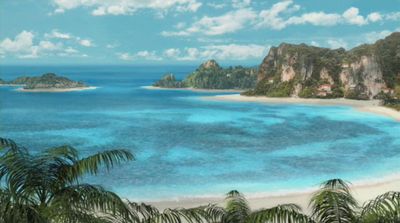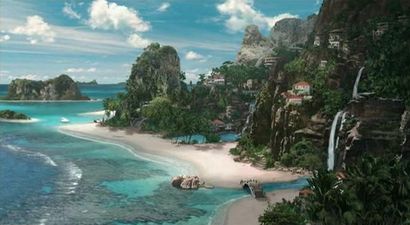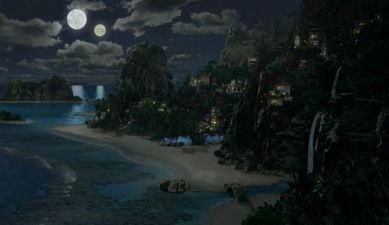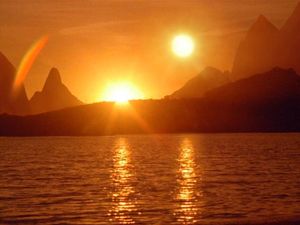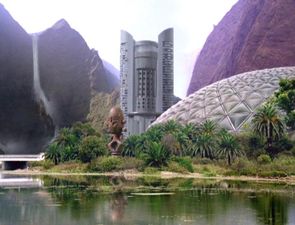Risa
| Stellar Cartography |
|---|
| Galactic Atlas • Campaign Regions • Spatial Regions • Star Systems • Nebulae • Star Charts |
"The place is called Risa and believe me, Captain, it is a paradise. Warm tropical breezes, exotic foods, nothing to do but sit around all day, enjoy the quiet, and then..." — Commander William Riker Risa is an inhabited Federation planet, famous for its engineered, balmy climate. It is the homeworld of the humanoid Risians, and governed by the Risa Hedony. It is orbited by three moons, and located in a binary system about ninety light years from the Sol system, and Starbase 12 is located a short distance away. Star System
Planetary Data
Climate and GeographyOriginally a dismal, rain-soaked, and geologically unstable planet, Risa suffered through years of tectonic activity resulted in the planet's surface being fragmented into ten small continents, all about the same size, and all located around the equator. However, the planet was transformed by the native Risians with a technologically sophisticated weather control network that provided almost-constantly desirable weather, as well as seismic regulators to eliminate the geological instabilities. The planet has two very small ice caps which gave it a hint of natural coldness. By at least the mid-22nd century, Risa became known for its beautiful tropical resorts and abundance of pristine beaches, making it a popular tourist destination.
Bodies of water
SettlementsNuviaThe captial city. Suraya BaySuraya Bay is a coastal resort, known for the villas built into the cliffs and as an excellent diving location. It is where Lohlunat, the Festival of the Moon, is celebrated. Outside of the busy festival period, it is considered to be peaceful and quiet, an ideal location for those who wish to spend their holiday in more solitary pursuits. Temtibi Lagoon The Temtibi Lagoon is a popular tourist destination, with warm waters and sweet-smelling breezes. The planet's weather control system ensures that the lagoon never experiences rainfall, and there are plentiful hot springs in the surrounding hills. Monagas PeninsulaOne of the more popular regions on the planet. The largest resort in the Monagas Peninsula is the Sheltered Arms resort. Other Known Settlements
Areas of InterestGalarthaGalartha is a popular rock climbing destination, notable for having a cliff face that changed pitch and handholds while a person climbs it. Other Points of Interest
AnimalsRisan sea turtleThe Risan sea turtle was a aquatic reptile indigenous to Risa, capable of camouflaging themselves on the sands. They have been known to deliver nasty bites if disturbed.
CultureThe Horga'hnA horga'hn is a statuette that symbolises fertility on Risa. It comes in many sizes, from small carvings to statues to a hotel with a giant horga'hn built into it. It is believed that to own one was to call forth its powers. Displaying one publicly indicated that one was seeking jamaharon, a mysterious and pleasurable sexual practice native to Risa. PaschanA festival of rebirth and renewal, celebrated every spring. LohlunatThe Festival of the Moon is celebrated annually, every summer, in Suraya Bay. It has become a major draw for tourists, with the usually serene Suraya Bay playing host to dance parties, beach-side competitions, aerial tours of the island, and powerboard races across the sea.
Recent HistorySee also: Risian History In all, the project took almost seven years, and was successful beyond all wildest hopes. The Risian government that requested that three areas areas were left untouched by the project, as a reminder of just how fragile life can be. These memorials draw both local pilgrims and tourists, and are a valued reminder of history as the rest of planet shows little trace of the Borg attack. |
| Galactic Atlas |
|---|


